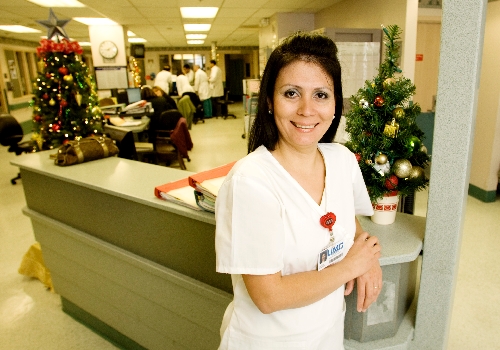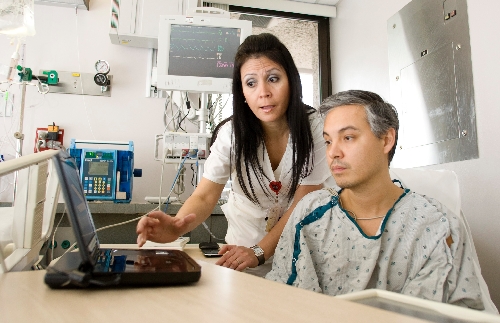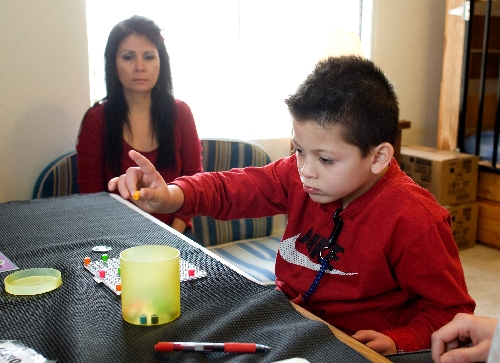Nurse feels for her patients





Weakened by two open heart operations in two months, Mabel McClure’s voice is barely audible as nurse Grace Samson brushes her hair.
"Oh, that feels so good," McClure said, tears streaming down her face. "You always treat me so nice. I only made it because of you nurses."
It is 9 a.m. Thursday in the cardiovascular critical care unit at University Medical Center. Patients, many of whom are alive only because of the latest medical technology and techniques, must be closely monitored.
Nurses never care for more than two patients — and usually only one after the patient has undergone a procedure — because seconds, not minutes, can mean the difference between life and death.
"We were afraid we were going to lose you there for a while," Samson tells the 53-year-old McClure, who holds the nurse’s hand that rests on her shoulder. "But now maybe you’ll go home for Christmas and see your grandchildren."
Samson, a 20-year nursing veteran, was named one of the March of Dimes Nurses of the Year, the largest and oldest event of its kind in the nation. Nearly 2,000 nurses in the Las Vegas Valley were nominated earlier this year by patients, friends, co-workers and other health professionals. A nursing panel judges the nominations anonymously, and there were 24 winners in an array of specialities. Samson won for cardiovascular critical care in Southern Nevada.
Samson, whose husband, Eugene, is a website developer at UMC, didn’t show up for the November ceremony at Caesars Palace.
"I was pretty exhausted on that night," she said recently as she sat inside her Henderson home. "Plus, I really didn’t think I would win. There are so many deserving nurses."
On Wednesday, the mother of three children did what she so often does when she is at home, patiently worked with her 6-year-old son, Evan, who has been diagnosed with Angelman syndrome. The rare genetic disorder causes development delay and neurological problems.
Evan will never talk, though he does make high-pitched sounds to signal distress and joy. Doctors expect his life span to be normal.
Outfitted with braces on his legs to help stabilize him, he still repeatedly falls. The bathroom is too much of a challenge for him.
Often, Evan laughs with his hands in the air, a trait that caused Dr. Harry Angelman, the British pediatrician credited with defining the syndrome in 1965, to first refer to the medical condition as "happy puppet syndrome."
A washable covering blankets all furniture in the house.
"My Evan throws up at least once a day, and I need to be able to wash it easily, " Samson said as she watched a tutor work to improve Evan’s small motor skills.
Tutors and others who care for Evan during the day cost the family about $3,000 a month.
"My other sons (Eric, 13 and Ethan, 8) give Evan so much love," she said. "They’re very mature for their ages. They just pitch in and help with him."
Extremely hyperactive, Evan seldom sleeps more than four hours a night, which generally means his parents get little sleep as well.
"He gets up at about 2 in the morning," Samson said. "If he plays contentedly, we can get some more sleep. But sometimes it is exhausting."
While Evan’s syndrome sometimes is exhausting, Samson said it has made her a better person and better nurse.
"I was always patient and empathetic, but I’m much more so now," she said. "He’s taught me all about unconditional love."
Sixty-four-year-old Mark Hadley, who was recruited by Samson for a clinical research trial for medication for his heart condition, knows all about her patience and empathy.
"When I went to get my blood work and other tests done, she would never just park me," he said. "She would be right there talking to me. And I was always amazed at how she called me at home to check up on how I was doing. You just wanted to pick her up and hug her. She cares so much about her patients."
Dr. Chowdhury Ahsan, the chief of cardiology who oversees cardiac research at UMC, has been amazed at how Samson works with patients.
"She offers to go their homes and pick them up," he said. "She does whatever it takes to make sure they make their appointments. She’s as empathetic a person as you will ever find. It’s a great quality in medicine. "
Forty-year-old Gabriel Contreras found out about Samson’s empathy Thursday when she counseled him on the test he had to go through later in the day.
Contreras, a visual merchandiser — he makes the merchandise look more appealing throughout the Dolce & Gabbana designer clothing store for the Forum Shops at Caesars — had suffered a heart attack earlier in the week.
"I really appreciate your explaining this to me so well," Contreras said as he watched a video Samson ran on a laptop computer. "All of this is hard to believe."
"I want you as comfortable as possible with what we’re doing," Samson said.
A warning system went off in the critical care unit.
"When you’re a nurse, you’re really needed," Samson said. "That’s a good feeling."
Contact reporter Paul Harasim at pharasim@reviewjournal.com or 702-387-2908.












